globalization 的参考译文(.11)复习过程
- 格式:doc
- 大小:58.00 KB
- 文档页数:9
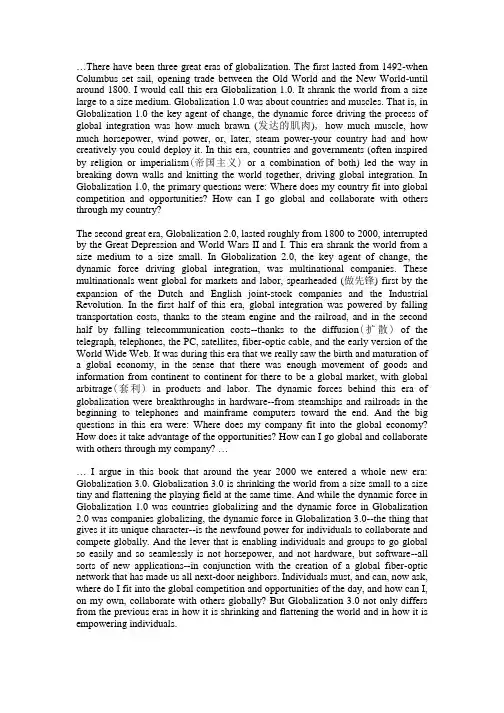
…There have been three great eras of globalization. The first lasted from 1492-when Columbus set sail, opening trade between the Old World and the New World-until around 1800. I would call this era Globalization 1.0. It shrank the world from a size large to a size medium. Globalization 1.0 was about countries and muscles. That is, in Globalization 1.0 the key agent of change, the dynamic force driving the process of global integration was how much brawn (发达的肌肉), how much muscle, how much horsepower, wind power, or, later, steam power-your country had and how creatively you could deploy it. In this era, countries and governments (often inspired by religion or imperialism(帝国主义)or a combination of both) led the way in breaking down walls and knitting the world together, driving global integration. In Globalization 1.0, the primary questions were: Where does my country fit into global competition and opportunities? How can I go global and collaborate with others through my country?The second great era, Globalization 2.0, lasted roughly from 1800 to 2000, interrupted by the Great Depression and World Wars II and I. This era shrank the world from a size medium to a size small. In Globalization 2.0, the key agent of change, the dynamic force driving global integration, was multinational companies. These multinationals went global for markets and labor, spearheaded (做先锋) first by the expansion of the Dutch and English joint-stock companies and the Industrial Revolution. In the first half of this era, global integration was powered by falling transportation costs, thanks to the steam engine and the railroad, and in the second half by falling telecommunication costs--thanks to the diffusion(扩散)of the telegraph, telephones, the PC, satellites, fiber-optic cable, and the early version of the World Wide Web. It was during this era that we really saw the birth and maturation of a global economy, in the sense that there was enough movement of goods and information from continent to continent for there to be a global market, with global arbitrage(套利)in products and labor. The dynamic forces behind this era of globalization were breakthroughs in hardware--from steamships and railroads in the beginning to telephones and mainframe computers toward the end. And the big questions in this era were: Where does my company fit into the global economy? How does it take advantage of the opportunities? How can I go global and collaborate with others through my company? ……I argue in this book that around the year 2000 we entered a whole new era: Globalization 3.0. Globalization 3.0 is shrinking the world from a size small to a size tiny and flattening the playing field at the same time. And while the dynamic force in Globalization 1.0 was countries globalizing and the dynamic force in Globalization 2.0 was companies globalizing, the dynamic force in Globalization 3.0--the thing that gives it its unique character--is the newfound power for individuals to collaborate and compete globally. And the lever that is enabling individuals and groups to go global so easily and so seamlessly is not horsepower, and not hardware, but software--all sorts of new applications--in conjunction with the creation of a global fiber-optic network that has made us all next-door neighbors. Individuals must, and can, now ask, where do I fit into the global competition and opportunities of the day, and how can I, on my own, collaborate with others globally? But Globalization 3.0 not only differs from the previous eras in how it is shrinking and flattening the world and in how it is empowering individuals.It is different in that Globalization 1.0 and 2.0 were driven primarily by European and American individuals and businesses. Even though China actually had the biggest economy in the world in the eighteenth century, it was Western countries, companies, and explorers who were doing most of the globalizing and shaping of the system. But going forward, this will be less and less true. Because it is flattening and shrinking the world, Globalization 3.0 is going to be more and more driven not only by individuals but also by a much more diverse-non-Western, non-white-group of individuals. Individuals from every corner of the flat world are being empowered. Globalization 3.0 makes it possible for so many more people to plug and play, and you are going to see every color of the human rainbow take part…。
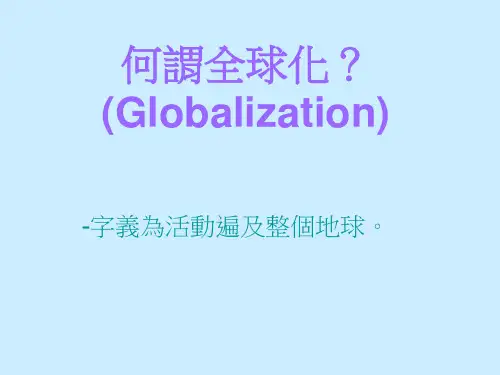
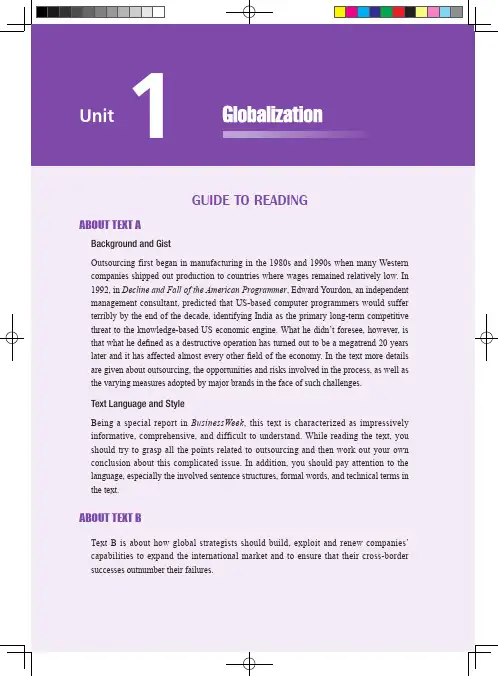
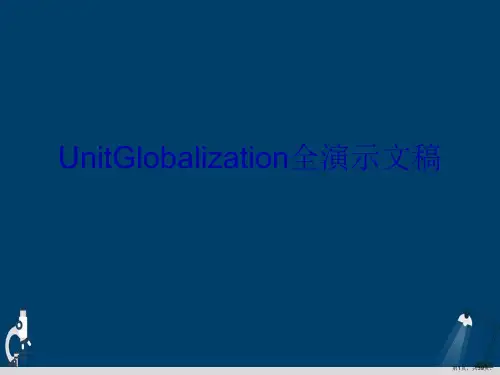
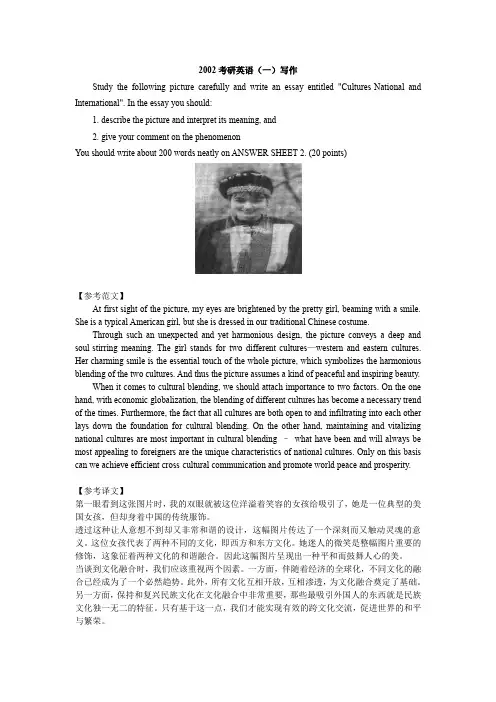
2002考研英语(一)写作Study the following picture carefully and write an essay entitled "Cultures-National and International". In the essay you should:1. describe the picture and interpret its meaning, and2. give your comment on the phenomenonYou should write about 200 words neatly on ANSWER SHEET 2. (20 points)【参考范文】At first sight of the picture, my eyes are brightened by the pretty girl, beaming with a smile. She is a typical American girl, but she is dressed in our traditional Chinese costume.Through such an unexpected and yet harmonious design, the picture conveys a deep and soul-stirring meaning. The girl stands for two different cultures—western and eastern cultures. Her charming smile is the essential touch of the whole picture, which symbolizes the harmonious blending of the two cultures. And thus the picture assumes a kind of peaceful and inspiring beauty.When it comes to cultural blending, we should attach importance to two factors. On the one hand, with economic globalization, the blending of different cultures has become a necessary trend of the times. Furthermore, the fact that all cultures are both open to and infiltrating into each other lays down the foundation for cultural blending. On the other hand, maintaining and vitalizing national cultures are most important in cultural blending –what have been and will always be most appealing to foreigners are the unique characteristics of national cultures. Only on this basis can we achieve efficient cross-cultural communication and promote world peace and prosperity.【参考译文】第一眼看到这张图片时,我的双眼就被这位洋溢着笑容的女孩给吸引了,她是一位典型的美国女孩,但却身着中国的传统服饰。
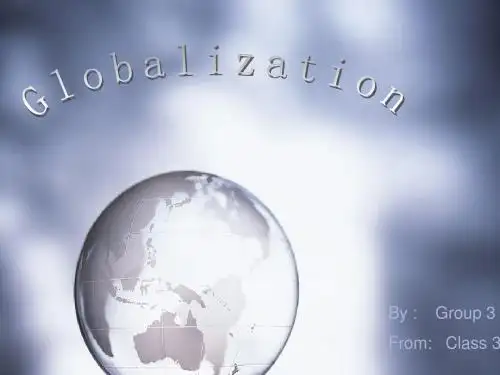
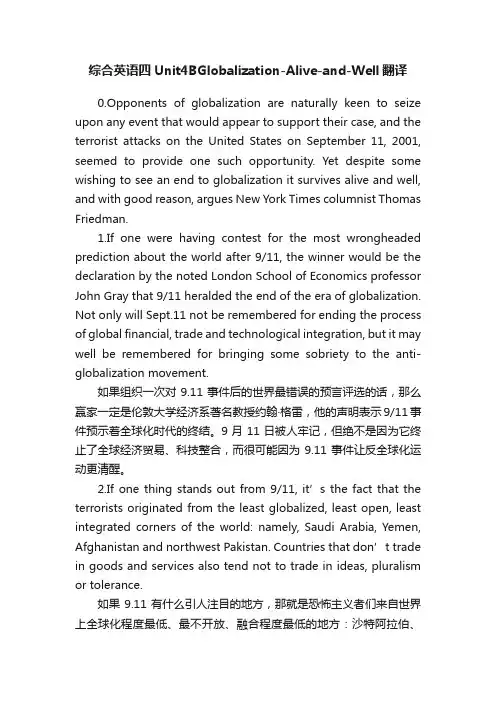
综合英语四Unit4BGlobalization-Alive-and-Well翻译0.Opponents of globalization are naturally keen to seize upon any event that would appear to support their case, and the terrorist attacks on the United States on September 11, 2001, seemed to provide one such opportunity. Yet despite some wishing to see an end to globalization it survives alive and well, and with good reason, argues New York Times columnist Thomas Friedman.1.If one were having contest for the most wrongheaded prediction about the world after 9/11, the winner would be the declaration by the noted London School of Economics professor John Gray that 9/11 heralded the end of the era of globalization. Not only will Sept.11 not be remembered for ending the process of global financial, trade and technological integration, but it may well be remembered for bringing some sobriety to the anti-globalization movement.如果组织一次对9.11事件后的世界最错误的预言评选的话,那么赢家一定是伦敦大学经济系著名教授约翰·格雷,他的声明表示9/11事件预示着全球化时代的终结。
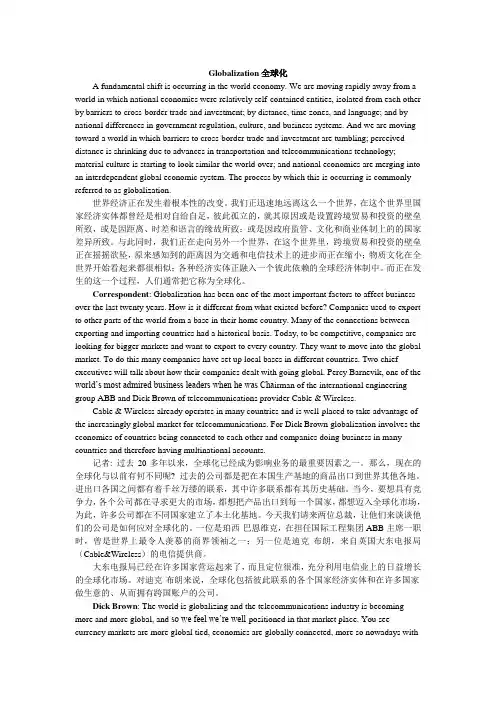
Globalization 全球化A fundamental shift is occurring in the world economy. We are moving rapidly away from a world in which national economies were relatively self-contained entities, isolated from each other by barriers to cross-border trade and investment; by distance, time zones, and language; and by national differences in government regulation, culture, and business systems. And we are moving toward a world in which barriers to cross-border trade and investment are tumbling; perceived distance is shrinking due to advances in transportation and telecommunications technology; material culture is starting to look similar the world over; and national economies are merging into an interdependent global economic system. The process by which this is occurring is commonly referred to as globalization.世界经济正在发生着根本性的改变。
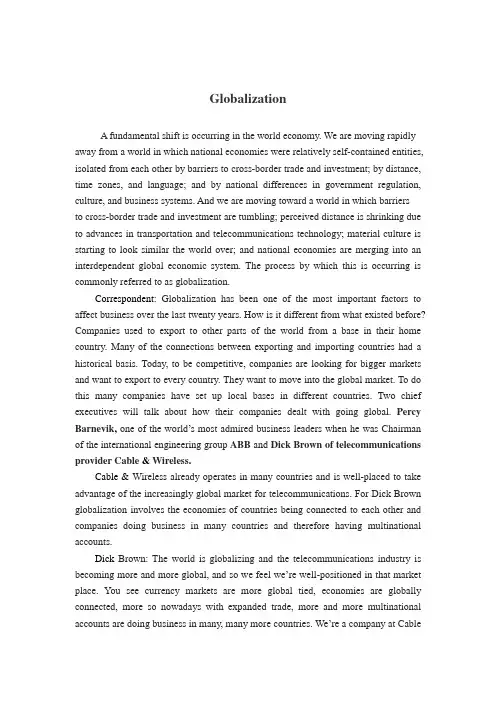
GlobalizationA fundamental shift is occurring in the world economy. We are moving rapidly away from a world in which national economies were relatively self-contained entities, isolated from each other by barriers to cross-border trade and investment; by distance, time zones, and language; and by national differences in government regulation, culture, and business systems. And we are moving toward a world in which barriersto cross-border trade and investment are tumbling; perceived distance is shrinking due to advances in transportation and telecommunications technology; material culture is starting to look similar the world over; and national economies are merging into an interdependent global economic system. The process by which this is occurring is commonly referred to as globalization.Correspondent: Globalization has been one of the most important factors to affect business over the last twenty years. How is it different from what existed before? Companies used to export to other parts of the world from a base in their home country. Many of the connections between exporting and importing countries had a historical basis. Today, to be competitive, companies are looking for bigger markets and want to export to every country. They want to move into the global market. To do this many companies have set up local bases in different countries. Two chief executives will talk about how their companies dealt with going global.Percy Barnevik,one of the world’s most admired business leaders when he was Chairman of the international engineering group ABB and Dick Brown of telecommunications provider Cable & Wireless.Cable & Wireless already operates in many countries and is well-placed to take advantage of the increasingly global market for telecommunications. For Dick Brown globalization involves the economies of countries being connected to each other and companies doing business in many countries and therefore having multinational accounts.Dick Brown: The world is globalizing and the telecommunications industry is becoming more and more global, and so we feel we’re well-positioned in that market place. You see currency markets are more global tied, economies are globally connected, more so nowadays with expanded trade, more and more multinational accounts are doing business in many, many more countries. We’re a company at Cable& Wireless now, well-positioned to carry the traffic and to provide the services to more and more companies that now need to get to five countries or twelve countries, we’re often there.Correspondent: When Percy Barnevik became head of the international engineering group ABB, his task was to make globalization work. He decided to divide the business into over a thousand smaller companies. In this way he believed the company could be both global and local. In answering the question“How do you make globalization work?”, Percy Barnevik describes the“global glue” that keeps the many different people in ABB together. He then looks at the need to manage the three contradictions of company: it is decentralized but centrally controlled, it is big and small at the same time and it is both global and local.Percy Barnevik: We have now for ten years after our big merger created a “global glue” where people are tied together, where they don’t internally compete, but support each other, and you have global leaders with global responsibility and your local managers working with their profit centers, and if you have the right, so to say, agenda for these people and the right structure, you can use a scale of economy and your advantages of bigness but being small. We used to say you have three contradictions: decentralized and still centrally controlled, big and small, global and local, and, of course, to try to make these contradictions work together effectively, then I think you have a big organizational competitive edge.Correspondent: Globalizations can bring advantage to a business, but how does a company go global? Dick Brown mentions three ways companies can achieve “globalness”. Firstly, companies can work together in alliances. Secondly, they can acquire or buy other companies, and thirdly they can grow organically by expanding from their existing base.Dick Brown: Well, as you go global, and a handful or more of companies are going to really push out, in my view, to be truly global companies, and some of them, maybe all of them, will also work to be local. They’ll be local in chosen markets and global in their ability to carry their customers’ needs from continent A to continent B. We want to be one of the companies that’s both global and local. Alliances are one way to be global, it’s not the only way to be global; you can acquire your way to “globalness”, you can organically grow your way to“globalness”, you can have alliances which help you get global quicker, so you take your pick.Percy Barnevik: You have to start from the top with local people who understand language, culture and so on, and I think in this global world where the East is comingup now, that’s a winning recipe.Correspondent: ABB already found the winning recipe. Its theory of globalization has become the company’s working practice. So how do you make theory work in practice? Percy Barnevik believes that successful globalization involves getting people to work together, overcoming national, cultural barriers and making the organization customer-driven.Percy Barnevik: You see the easy thing is to have the theory, but then to make the systems work, to make people really work together, to trust each other—Americans, Europeans, Asians, to get over these national cultural barriers and create a common glue, ABB, and then make them customer-driven. If you can achieve that, and create that culture deep down then I think you have an important competitive edge.Correspondent: What Dick Brown and Percy Barnevik have shown is that there are different routes to globalization and that companies have to work hard to succeed in going global. Actually one of the disadvantages of the Global Strategy is that integrated competitive moves can lead to the sacrificing of revenues, profits, or competitive positions in individual countries—especially when the subsidiary in one country is told to attack a global competitor in order to convey a signal or divert that competitor’s resources from another nation. The challenges managers of transnational corporations face are to identify and exploit cross-border synergies and to balance local demands with the global vision for the corporation. Building an effective transnational organization requires a corporate culture that values global dissimilarities across cultures and markets.全球化世界经济正在发生根本性转变。
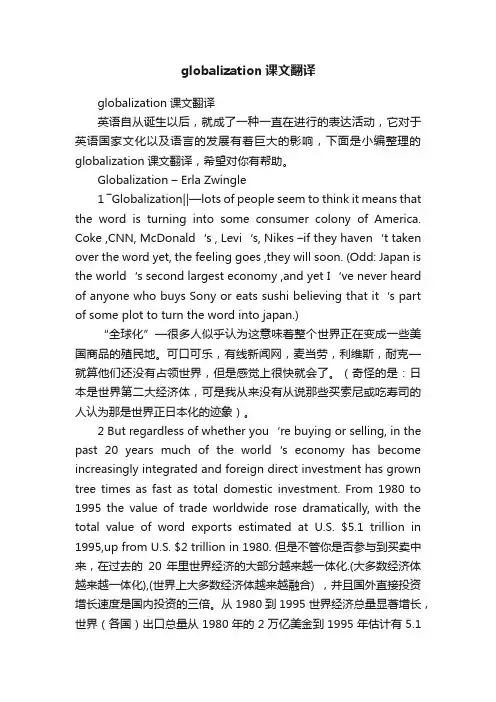
globalization课文翻译globalization课文翻译英语自从诞生以后,就成了一种一直在进行的表达活动,它对于英语国家文化以及语言的发展有着巨大的影响,下面是小编整理的globalization课文翻译,希望对你有帮助。
Globalization – Erla Zwingle1 ―Globalization‖—lots of people seem to think it means that the word is turning into some consumer colony of America. Coke ,CNN, McDonald‘s , Levi‘s, Nikes –if they haven‘t taken over the word yet, the feeling goes ,they will soon. (Odd: Japan is the world‘s second largest economy ,and yet I‘ve never heard of anyone who buys Sony or eats sushi believing that it‘s part of some plot to turn the word into japan.)“全球化”—很多人似乎认为这意味着整个世界正在变成一些美国商品的殖民地。
可口可乐,有线新闻网,麦当劳,利维斯,耐克—就算他们还没有占领世界,但是感觉上很快就会了。
(奇怪的是:日本是世界第二大经济体,可是我从来没有从说那些买索尼或吃寿司的人认为那是世界正日本化的迹象)。
2 But regardless of whether you‘re buying or selling, in the past 20 years much of the world‘s economy has become increasingly integrated and foreign direct investment has grown tree times as fast as total domestic investment. From 1980 to 1995 the value of trade worldwide rose dramatically, with the total value of word exports estimated at U.S. $5.1 trillion in 1995,up from U.S. $2 trillion in 1980. 但是不管你是否参与到买卖中来,在过去的20 年里世界经济的大部分越来越一体化.(大多数经济体越来越一体化),(世界上大多数经济体越来越融合) ,并且国外直接投资增长速度是国内投资的三倍。
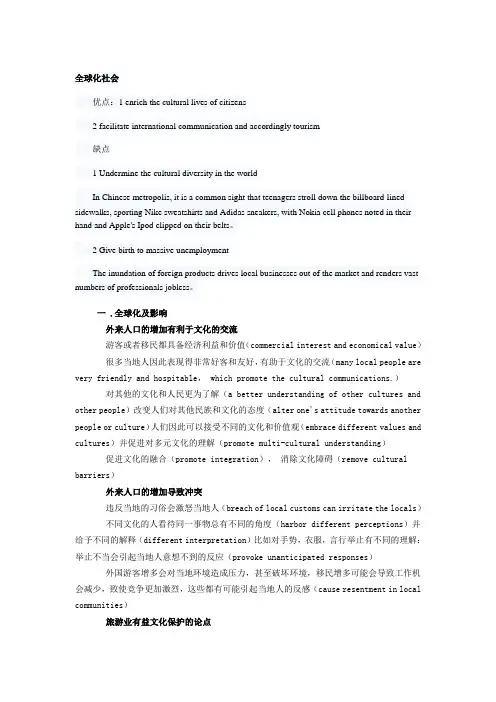
全球化社会优点:1 enrich the cultural lives of citizens2 facilitate international communication and accordingly tourism缺点1 Undermine the cultural diversity in the worldIn Chinese metropolis, it is a common sight that teenagers stroll down the billboard-lined sidewalks, sporting Nike sweatshirts and Adidas sneakers, with Nokia cell phones noted in their hand and Apple's Ipod clipped on their belts。
2 Give birth to massive unemploymentThe inundation of foreign products drives local businesses out of the market and renders vast numbers of professionals jobless。
一 .全球化及影响外来人口的增加有利于文化的交流游客或者移民都具备经济利益和价值(commercial interest and economical value)很多当地人因此表现得非常好客和友好,有助于文化的交流(many local people are very friendly and hospitable, which promote the cultural communications.)对其他的文化和人民更为了解(a better understanding of other cultures and other people)改变人们对其他民族和文化的态度(alter one's attitude towards another people or culture)人们因此可以接受不同的文化和价值观(embrace different values and cultures)并促进对多元文化的理解(promote multi-cultural understanding)促进文化的融合(promote integration),消除文化障碍(remove cultural barriers)外来人口的增加导致冲突违反当地的习俗会激怒当地人(breach of local customs can irritate the locals)不同文化的人看待同一事物总有不同的角度(harbor different perceptions)并给予不同的解释(different interpretation)比如对手势,衣服,言行举止有不同的理解:举止不当会引起当地人意想不到的反应(provoke unanticipated responses)外国游客增多会对当地环境造成压力,甚至破坏环境,移民增多可能会导致工作机会减少,致使竞争更加激烈,这些都有可能引起当地人的反感(cause resentment in local communities)旅游业有益文化保护的论点除了自然景观(landscape)之外,文化和历史是吸引游客去一个国家或者一个旅游景点(tourism site)观光的最主要原因(motivator ):旅游业和文化遗产相结合(integrate tourism and cultural heritage)为文化保护提供了经济支持(economical incentives)在文化领域提供了一些旅游选择(introduce the tourism options available with the cultural sectors)如博物馆,历史景点,活动和美食等(museums, historical sites,events and cuisine),游客会深入了解当地传统和习俗(get an insight into local customs and traditions )感受当地传统和艺术(experience local traditions, arts and heritages)从而更加尊重当地社区和周围环境(respect the local community and its environment),促进不同国家之间关于自然和文化资源保护的交流和对话(the dialogue over conservation of natural and cultural resources.)旅游业导致文化破坏的观点(cultural destruction)保护的一般是食物,时尚,节日等一些文化的表面特征(superficial elements of culture),将文化定格成表演者(freeze culture as performers)导致了文化,宗教,传统仪式,物质文化和语言的损失(the loss of culture, religion, rituals, material culture and language):将文化商业化(commercialize the culture ),破坏了文化神圣和独特的本质(erode the sacred and unique nature);垃圾,涂鸦,破坏和噪音不断增加(increasing litter, graffiti, vandalism and noise),游客在没有被允许的情况下进入建筑物,神殿,神圣的土地(enter building,shrines, or sacred lands without permission),这都与当地文化相冲突,是一种文化侮辱(an insult to the local culture)【真题】Nowadays we can enjoy the same films, fashions, brands, advertisements and TV channels. The evident difference between countries is disappearing. To what extent do you think the disadvantages overweight the advantages of this?Globalization creates conditions for widening international exchanges, strengthening mutual understanding between nations, expanding cultural, educational, and scientific cooperation between nations and countries, enjoyingthe cultural achievements of people around the world which encourages the process of modernization and the enrichment of national culture.However, these conditions also create the possible danger of diminishing the national culture with a negative impact on the pre123vation of national identity.cultural products can easily be imported into the country. At present, modernintensively disseminating US ideology, way of life, culture and films across the world. Even US food is promoted so that some people consider globalization as global Americanization.developing countries has been increasing and the gap between the rich and the poor has become wider, most of the result of globalization go to assist developed countries. Globalization does not pose equal interests and risks to allcountries in terms of finance and the level of science and technology, developed ca123alist countries control the situation of economic globalization.integration but also have to take the initiative in fighting to keep our distinctpsychology of preferring money over ethical values.Even though globalization affects the world’s economies in a positive way, its negative side should not be forgotten. Discuss.In the present age, globalization is playing an increasingly important role in our lives. But in the meantime whether it is a blessing or acurse(用词生动)has sparked (好词)a heated debate. Some people argue that globalization has a fundamentally beneficial influence on our lives, while many others contend that it has a detrimental(好词) effect as well.(两边观点明确提出,并且在下面两段具体分析,最后总结,形成完整的结构)A convincing(有说服力的)argument can bemade about globalization not only playing a pivotal role in the development of technology and economy, but also promoting the cultural exchange between different countries. (这样的观点值得考生借鉴)To start with, it is the globalization that impelled (用词准确)many corporate(这儿忘记是复数,小遗憾) to become an international group, thereby(thereby用的很好,这种连接词平时很容易忽略)making a contribution to the local technology and employment. Specifically, when a multinational group establish a factory in a developing country, the new equipment, the new management skills and the job vacancies are all in the best interest of the local society. Moreover, people worldwide can get to know each other better through globalization. It is easy to see that more and more Hollywood blockbusters(好莱坞大片,这个词组用的很好) show cultures different from American, some recent examples are ‘Kungfu Panda’ and ‘The Mummy’。
2020.11 CATTI英语二级笔译实务试题英译汉参考译文仅供参考English-Chinese TranslationTranslate the following two passages into English.【Passage 1】The world is at a social, environmental and economic tipping point. Subdued growth, rising inequalities and accelerating climate change provide the context for a backlash against capitalism, globalization, technology, and elites. There is gridlock in the international governance system and escalating trade and geopolitical tensions are fueling uncertainty. This holds back investment and increases the risk of supply shocks: disruptions to global supply chains, sudden price spikes or interruptions in the availability of key resources.Persistent weaknesses in the drivers of productivity growth are among the principal culprits. In advanced, emerging and developing economies, productivity growth started slowing in 2000 and decelerated further after the crisis. Between 2011 and 2016, “total factor productivity growth” – or the combined growth of inputs, like resources and labour, and outputs - grew by 0.3 percent in advanced economies and 1.3 percent in emerging and developing economies.The financial crisis added to this deceleration. Investments are undermined by uncertainty, low demand and tighter credit conditions. Many of the structural reforms designed to revive productivity that were promised by policy-makers did not materialize.Governments must better anticipate the unintended consequences of technological integration and implement complementary social policies that support populations through the Fourth Industrial Revolution. Economies with strong innovation capability must improve their talent base and the functioning of their labor markets.Adaption is critical. We need an a well-functioning labour market that protects workers, not jobs. Advanced economies need to develop their skills base and tackle rigidities in their labour markets. As innovation capacity grows, emerging economies need to strengthen their skills and labour market to minimize the risks of negative social spillovers.Sustainable economic growth remains the surest route out of poverty and a core driver of human development. For the past decade, growth has been weak and remains below potential in most developing countries, seriously hampering progress on several of the UN’s 2030 sustainable development Goals (SDGs).The world is not on track to meet any of the SDGS. Least developed countries have missed the target of 7 percent growth every year since 2015. Extreme poverty reduction is decelerating. 3.4 billion people –or 46 percent of the world’s population – lived on less than US$5.50 a day and struggled to meet basic needs. After years of steady decline, hunger has increased and now affects 826 million up from 784 million in 2015. A total of 20 percent of Africans population is undernourished. The “zero hunger” target will almost certainly be missed.参考译文世界正处在社会、环境和经济的转折点。
全球化Globalization英文论述第一篇:全球化Globalization英文论述Globalization Globalization is the process of international integration arising from the interchange of world views, products, ideas and other aspects of culture.Advances in transportation and telecommunications infrastructure, including the rise of the telegraph and its posterity the Internet, are major factors in globalization, generating further interdependence of economic and cultural activities.World have connection into a whole, forming a global village.Nowadays no one nation can go out of the world and the development of the closed.Economic globalization:Economic globalization is the increasing economic interdependence of national economies across the world through a rapid increase in cross-border movement of goods, service, technology and capital.Whereas the globalization of business is centered around the diminution of international trade regulations as well as tariffs, taxes, and other impediments that suppresses global trade, economic globalization is the process of increasing economic integration between countries, leading to the emergence of a global marketplace or a single world market.The world economy is very close.A country's economic crisis is likely to affect the worldsocio-cultural globalization:Cultural globalization has increased cross-cultural contacts but may be accompanied by a decrease in the uniqueness of once-isolated communities.Such as rock, jeans, such as Coca-Cola spread around the world.For example, sushi is available in Germany as well as Japan but Euro-Disney outdraws the city of Paris, potentially reducing demand for “authentic” French pastry.Globalization's contribution tothe alienation of individuals from their traditions may be modest compared to the impact of modernity itself.Globalization has expanded recreational opportunities by spreading pop culture, particularly via the Internet and satellite television.the Internet connects computer users around the world.From 2000 to 2009, the number of Internet users globally rose from 394 million to 1.858 billion.By 2010, 22 percent of the world's population had access to computers with 1 billion Google searches every day, 300 million Internet users reading blogs, and 2 billion videos viewed daily on YouTube.The example of globalization:AIRBUS,ADIDAS.Globalization has a lot of good or bad influence to us.First talk about the positive: worldwide the number of common standards;the growth of international trade faster than the world economic growth;the proportion of multinational companies in the world economy;the development of the global financial system;and More and more international cultural influence, such as through the export of Hollywood movies;promote the development of international tourism;a lot of information resources sharing via the Internet.The bad influence is the widening gap between the rich and poor;the increase of illegal immigrants;The expansion of terrorism;Its unemployment rate increaseThe Finally, statement about my point of view.The trend of globalization is irreversible, we should conform to this trend, we should not go against globalization.If you resist the globalization is obvious, north Korea is resist globalization, so the economy is backward, and there also very miserably of people's life.Globalization makes countries can share resources, cheap goods, technology have very convenient also, human resources also can free flow between countries, promote the prosperity ofthe national economy.At the same time, also promote the spread of cultural globalization, cultural communication is also more frequently, is conducive to the development of national culture.Although a lot of the benefits of globalization, but also should pay attention to protect our country own business brand, technology, enhance the value of the independent brand, pay attention to brand building, in this way, can we have their own advantages in the globalization.第二篇:口语情景对话:全球化 GlobalizationTodd: OK.Jamie.We're back.杰米,我们开始吧。
全球化英语作文全球化英语作文(通用11篇)在日常学习、工作或生活中,许多人都有过写作文的经历,对作文都不陌生吧,作文根据体裁的不同可以分为记叙文、说明文、应用文、议论文。
一篇什么样的作文才能称之为优秀作文呢?以下是店铺整理的全球化英语作文,希望能够帮助到大家。
全球化英语作文篇1Globalization is a declarationof war upon all other cultures. And in culture wars, there is no exemption of civilians, there are no innocent bystanders. Why should it be expected that ancient and rooted civilizations are going to accept this peripheralisationwithout a struggle? The answer to that is that globalization carries an implicit promise that it will relieve poverty and offer securityperhaps the most ancient of human dreams. Because of the power of global capitalism to create wealth, it is assumed that this priority must sweep aside all other human preoccupations, including all existing institutions, interpretations and searches for meaning in the world.It is disingenuous to assume that economy, society and culture operate in separate spheres. This suggests that, one, exposed to the globalizing imperative, no aspect of social life, customary practice, traditionalbehaviour will remain the same.There have been, broadly, two principal responses in the world, which we may call the fatalistic and the resistant. It is significant that among the most fatalistic have been the leaders of G-7, Ex-President Clinton said globalization is a fact not a policy choice Tony Blair said it is inevitable and irreversible. It may be considered paradoxical that the leaders of the most dynamic and expanding economies in the world offer such a passive,unchallenging view of what are, after all, human-made arrangements. These are among the richest and most proactive regimes, which can wage endless war on the great abstraction, that is terror, topple regimes and lay down one WTO law for the poor and another for themselves. Is their helplessness in the presence of these mighty economic and cultural powers?全球化英语作文篇2What does globalization mean?We always hear this word on TV and read about it in newspapers. It means the world is now a village- The Global Village. The world has become smaller. Of course the world did not shrink and it isn't a village. Because of better transport, the Internet and more trading between countries, it is easier to do business. Japanese car makers have factories in Thailand. American computer companies employ thousands of people in China. That's globalization.And don't forget the millions of call centre jobs in India that workers in America and Europe used to do.Globalization also means it is easier to work in another country.So, is globalization a good or bad thing?That's a difficult question to answer.全球化英语作文篇3With the rapid social and economic development, globalization comes not to be an unfamiliar word to all of us. Though we are living in the affection of it, yet it is hard to tell it’s advantages and disadvantages.Globalization phenomenon is an outcome of social development. The typical types are economic globalization, cultural globalization. As we all know, it is a double-edged sword.Therefore, we must pay more attention on this phenomenon and it’s development trend.Globalization has so many advantages, such as it makes the world become a small village and let people touch each other more convenient and easy, it increase free trade between nations and give the developing countries a terrific opportunity to develop themselves in all aspects quickly. What’s more, it can reduce the cultural barriers and let various of cultural get a better communication and development. On the contrary, it also has a lot of disadvantages. Because under globalization, every country’s economy can make a great influence of others, it make the economy of the world more fragile. In order to possess the good chance and precious resources, the disputes and even wars may take place between nations. In recent years, great risk of diseases being transported between nations has also become a threaten to people.As the globalization has become an irrevocable trend, we must adjust it. This phenomenon is an opportunity as well as a challenge. Consequently, every person, every nation should try the best to get a good position in the process of globalization and make full use of such a vital chance to be stronger.全球化英语作文篇4A prevailing phenomenon is that countries have less different between each other nowadays. Different person holds different views to this trend. As for me, I think its advantages outweigh the disadvantages.It is obvious that if all the countries share the same things, minority nationality regions are affected by the developed countries. Then maybe their minority culture will vanish. Especially in today's word, the youth is more likely to understandmodern culture, and they could forget some culture from their own countries.Though it is unnegligiblethat the problem, I mentioned above, I still stick on my opinion that it has more advantages. First, there will be an excellent chance for people who are from different countries to have a communication. People possess similar hobbies and life style, and they will have more common topics to talk about. It really can narrow the gap between two countries.Second, economic globalization can be seen from this trend, promoting all the countries' economy development. And we can get all the goods we want wherever you are. The third one is language and education. Countries are becoming less evident means people break the barrier of the differences between two languages, and it is quite good for academic communication and high level education. We can learn advanced ideas and views directly.All in all, the globalization is promoting many aspects of the countries, and actually we are experienced in it and benefit from this trend. As a result, I hold the view that the advantages outweigh the drawbacks.全球化英语作文篇5Globalization has found a significant place in the lives of the people. During the process of globalization, we have made a bridge where ideas and beliefs can cross the borders, and the walls of distrust and the barriers of suspicion between countries have gradually.disappeared. Though globalization is seen as a sign of a hopeful future by some, there are others who believe that it can cause a horrible disaster for the world economy.Counties benefit a lot from globalization, especially thedeveloping countries. With it, there is a global market for companies to trade their products which can make the production sector develop rapidly. This gives lots of options to the manufacturers as well. Besides, competition keeps prices relatively low and it can provide a wider range of options for people, to choose from among the products of different nations. In addition, there is a sound flow of money, as a result, inflation is less likely to occur.But the disadvantages brought by globalization cannot be ignored. Globalization is causing Europeans to lose their jobs as work is being swerved to the Asian countries. The cost of labor in the Asian countriesis low as compared to other countries which is often argued that poor countries are exploited by the richer countries where the work force is taken advantage of and low wages are implemented. Moreover, companies are as opening their counterparts in other countries which can result in transferring the quality of their product to other countries, thereby increasing the chances of poor quality.Simply put, globalization is an ongoing process of integration of regional economies into global network of communication which the human being cannot hold back. So we should keep a positive attitude toward it, take good use of it and avoid disadvantages at the same time. Thus there will be a better world where all the people can have a brighter future.全球化英语作文篇6Even though globalization affects the world’s economies in a positive way, its negative side should not be forgotten. Discuss the advantages and disadvantages of globalization.In the present age, globalization is playing an increasinglyimportant role in our lives. But in the meantime whether it is a blessing or a curse has sparked a heated debate. Some people argue that globalization has a fundamentally beneficial influence on our lives, while many others contend that it has a detrimental effect as well.A convincing argument can be made about globalization is that it not only plays a pivotal role in the development of technology and economy, but also promotes the cultural exchange between different countries. To start with, it is the globalization that impelled many corporate to become an international group, thereby making a contribution to the local technology and employment. Specifically, when a multinational group establish a factory in a developing country, the new equipment, the new management skills and the job vacancies are all in the best interest of the local society. Moreover, people worldwide can get to know each other better through globalization. It is easy to see that more and more Hollywood blockbusters show cultures different from American, some recent examples are ‘Kungfu Panda’ and ‘The Mummy’.Admittedly, profit-driven globalization has severely affected young people. Today, in the metropolises in different countries, it is very common to see teenagers wearing NIKE T-shirts and Adidas footwear, playing Hip-Hop music on Apple iPods and eating at KFC. The culture that took a thousand years to form just seems similar in these cities; it looks like you can only distinguish them by their language. Meanwhile, in some developing countries, sweat workshops are always a concerning issue. For instance, reports show that some teenagers employed by NIKE’s contractors work in smelly factories over 14 hours a day, but are only paid fifty cents per hour.In summary, I would concede that globalization does come with some adverse effects. Despite that fact, benefits created by it far outweigh the disadvantages. Overall, I am convinced that we should further promote globalization and meanwhile the local government should take measures to combat cultural assimilation and sweat workshops.Increasing the price of petrol is the best way to solve growing traffic and pollution problems. To what extent do you agree or disagree? What other measures do you think might be effective? 全球化英语作文篇7The last decades has witnessed the accelerated advancement of economy,which brings the economic globalization,a tendence that we can never hold it back. Under the condition of economic globalization, cultural exchanges between countries and countries, regions and areas are frequent ,accompanied by opportunity it provides,we are also stood in front of the huge challenges to the culture.Just like a coin,which has two sides,on one aspect,the globalization is not only accelerating economic growth speed, spreading new technology and effective ways to improve the level of life rich and poor countries, but ,it is also a controversial process that may contribute to a national sovereignty, erosion infringement to local and traditional culture , and the threat of economic and social stability. Between globalization and culture that is a complementary relationship. And under the wave of economic globalization, how do we do at the same time of accepting foreign culture, can also maintain the development of traditional Chinese culture? From my perspective, For today's China,we’d better adhere to the use of Marxist ideological line and requirements of the socialist modernization, to analyze andcriticize thetraditional culture, to identify essence and dross with a calmand objective attitude, derive the traditional culture of all reasonable composition, gives our history a new contents and the era value, and Only in this way,can our china stride bravely forward under the impact of the globalization全球化英语作文篇8Globalization can be found in five different areas: economic, cultural, political, religious, and social systems.It should not be narrowly confused with economic globalization, which is only one aspect. While some scholars and observers of globalization stress convergence of patterns of production and consumption and a resulting homogenization of culture, power, stress, and hunger, others stress that globalization has the potential to take many diverse forms. In economics, globalization is the convergence of prices, products, wages, rates of interest and profits.Globalization of the economy depends on the role of human migration, international trade, movement of capital, and integration of financial markets. The International Monetary Fund notes the growing economic interdependence of countries worldwide through increasing volume and variety of cross-border trade.全球化英语作文篇9As soon as the gates that had been sealed for hundreds of years were opened, wolves and tigers swarmed in waiting for their chance. That time, we are still scarred. When the door opens again, is there more unspeakable sadness lurking behind the bright lights?When the word "globalization" became familiar, everything around it changed completely. Not to mention turning on yourcomputer is Microsoft WINDOWS; The NOKIA rang; A kiss between lovers leaves a MAYBELIAN scent. HARRYPORTER, a magical novel, has many super fans in China, and the classic of mountains and seas, a collection of classical Chinese myths, can hardly be found in the city's bookstores. There seems to be more to it. A foreigner visiting the countryside wants to take a photo with a local resident, only to find that the other person has already changed into a neat suit. When he wants to hear the unique local ethnic language, he has no choice but to hear the familiar standard mandarin. Perhaps in any Chinese city, there is only one simple phenomenon: the endless flow of vehicles, tall and dull rectangular buildings, glass walls reflecting strong light; And people are in a hurry, in this seems to be colorful clothing, but are marked with the same brand - fashion. Watching all this, there is an ancient cold ripples in the heart.It is just like a huge and magnificent sand sculpture on the seashore, which could not withstand the repeated attacks of the waves and eventually melted into the vast sea and ceased to exist. It seems that the Only thing left by Chinese culture to the Chinese people is historical memories.Killing and copying is our understanding of "globalization", at least now in practice: "killing" the ancient vicissitudes of Chinese culture to copy a Western civilization. The result? What we need is pure Chinese culture, not the so-called "westernization" which is neither fish nor fowl.We try to board the "globalization" bus, but ignore that this boarding ticket is our unique culture, is our own thing!Other people's things are other people's, rashly brought, can only hinder the foot of piracy, become a lot of copies of the inside of a. What's the point of "globalization" if it changes so much thatwe don't even recognize ourselves? If we lose our true self, what is the value of our continued existence?Standing at the gate of this "globalization" train, where will we "globalization" go from here?全球化英语作文篇10Globalization can be found in five different areas: economic, cultural, political, religious, and social systems.It should not be narrowly confused with economic globalization, which is only one aspect. While some scholars and observers of globalization stress convergence of patterns of production and consumption and a resulting homogenization of culture, power, stress, and hunger, others stress that globalization has the potential to take many diverse forms. In economics, globalization is the convergence of prices, products, wages, rates of interest and profits.Globalization of the economy depends on the role of human migration, international trade, movement of capital, and integration of financial markets. The International Monetary Fund notes the growing economic interdependence of countries worldwide through increasing volume and variety of cross-border transactions, free international capital flows, and more rapid and widespread diffusion of technology.全球化英语作文篇11In a debate competition, the topic was "In the context of globalization, learning a foreign language is more important than learning a mother tongue?" I chose the right side: learning a foreign language is more important than learning your mother tongue.Mastering a foreign language is a passport to the world. You will benefit from meeting a foreigner in the open air. Mothertongue is of course important, but mother tongue can only communicate with people in their own country. If you learn a foreign language well, such as English, which has been spread to many countries including China, you can improve your foreign culture level and understand the folk customs of each country.Mother tongue for us must learn, but we can not ignore foreign languages.When one learns one more language, it is of great benefit in the future! And again, if you can't speak a language that's universal, you're socially obsolete. As soon as we step out into the world, we will find foreign languages everywhere. That is why we start learning foreign languages in primary school.Although our country has a long history, but from our landing, in the background, environment, education and influenced by parents, our mother tongue has a good foundation, precisely because of this, we should learn English well, understand the Western culture in the integration of our eastern culture. Because the Oriental and western brains are different, natural thinking is also different, the Chinese made the compass, gunpowder and clocks...... In the West, there are more: TV, air conditioning, electric lights, telephones... Why we can watch TV, air conditioning... The reason is that we Chinese have an extra brain and a new language.Some people would say that learning a foreign language is disloyal to China. This reminds me of a joke: there are three children standing together to see who is the most patriotic. The first one says: "I never smoke foreign cigarettes." The second man said, "I never drink foreign wine." A third said, "I never pass foreign language exams."But in fact, it is not the case. Learning foreign languages canpromote the friendship between the two countries and the exchange of science and technology, which makes China become more powerful. I agree with an Australian, Fritton Misak, who once said, "Learning a foreign language is an extension of communication to people from other cultures and a valuable tool for international communication. There are great benefits to learning a foreign language or an international language. The biggest benefit is cross-cultural communication. This will promote global understanding and lay the foundation for world peace. Its applications in education, trade, industry, employment and travel are necessary and vital in an age when "all human beings are born to advance an evolving civilization."Therefore, I still stick to my position that in the context of globalization, learning foreign languages is more important than learning mother tongue.。
globalize词根词缀“globalize”这个词,它的核心部分是“global”,“global”的意思是“全球的,全世界的”。
这就像是一个大框架,把整个世界都涵盖进去了。
你想啊,当我们说“global issue”(全球问题)的时候,那就是在说这个事儿是和全世界都有关系的,像气候变化啦,那可不是一个小地方的事儿,是整个地球都在受影响的大事情呢。
那“ -ize”这个后缀可就很有趣啦。
它是一个动词后缀,有“使……化”的意思。
就像给“global”这个词注入了一股活力,让它动起来了。
加上“ -ize”之后,“global”就从一个表示状态的形容词变成了一个动作,“globalize”就是“使全球化”。
比如说,现在很多公司都在努力“globalize”,就是想让自己的业务遍布全球,把自己的产品和服务推广到世界的每一个角落。
这就好像是一个小种子,想要在全世界的土地上生根发芽一样。
我们再从词根词缀的角度深入一点看。
“global”这个词的词根其实和“globe”有关,“globe”就是“地球,球体”的意思。
你看,地球是一个大大的圆球,我们生活在这个圆球上,所有的国家、所有的人都在这个大圆球里。
所以当我们说“global”的时候,其实就是在说和这个大地球有关的事情。
这就像是我们在玩一个超级大的游戏,这个游戏的地图就是整个地球,而“global”相关的东西就是这个游戏里涉及到整个地图的元素。
从文化传播的角度来说,“globalize”这个词可太有意义了。
随着世界越来越小,信息传播得越来越快,各种文化都在“globalize”。
比如说,我们现在能很轻松地看到韩国的电视剧、美国的电影、日本的动漫,这些都是文化“globalize”的表现。
不同国家的文化就像不同颜色的彩带,在“globalize”的过程中交织在一起,形成了一幅五彩斑斓的画卷。
这就像是一场盛大的派对,每个国家都带着自己最酷的东西来参加,然后大家互相分享、互相学习。
G l o b a l i z a t i o n的参考译文(2013.11)GlobalizationA fundamental shift is occurring in the world economy. We are moving rapidly away from a world in which national economies were relatively self-contained entities, isolated from each other by barriers to cross-border trade and investment; by distance, time zones, and language; and by national differences in government regulation, culture, and business systems. And we are moving toward a world in which barriersto cross-border trade and investment are tumbling; perceived distance is shrinking due to advances in transportation and telecommunications technology; material culture is starting to look similar the world over; and national economies are merging into an interdependent global economic system. The process by which this is occurring is commonly referred to as globalization.Correspondent: Globalization has been one of the most important factors toaffect business over the last twenty years. How is it different from what existed before? Companies used to export to other parts of the world from a base in their home country. Many of the connections between exporting and importing countries had a historical basis. Today, to be competitive, companies are looking for bigger markets and want to export to every country. They want to move into the global market. To do this many companies have set up local bases in different countries. Two chief executives will talk about how their companies dealt with going global.Percy Barnevik,one of the world’s most admired business leaders when he was Chairmanof the international engineering group ABB and Dick Brown of telecommunications provider Cable & Wireless.Cable & Wireless already operates in many countries and is well-placed to take advantage of the increasingly global market for telecommunications. For Dick Brown globalization involves the economies of countries being connected to each other and companies doing business in many countries and therefore having multinational accounts.Dick Brown: The world is globalizing and the telecommunications industry is becoming more and more global, and so we feel we’re well-positioned in that market place. You see currency markets are more global tied, economies are globally connected, more so nowadays with expanded trade, more and more multinational accounts are doing business in many, many more countries. We’re a company atCable & Wireless now, well-positioned to carry the traffic and to provide the services to more and more companies that now need to get to five countries or twelve countries, we’re often there.Correspondent: When Percy Barnevik became head of the international engineering group ABB, his task was to make globalization work. He decided to divide the business into over a thousand smaller companies. In this way he believed the company could be both global and local. In answering the question“How do you make globalization work?”, Percy Barnevik describes the“global glue” that keeps the many different people in ABB together. He then looks at the need to manage the three contradictions of company: it is decentralized but centrally controlled, it is big and small at the same time and it is both global and local.Percy Barnevik: We have now for ten years after our big merger created a “global glue” where people are tied together, where they don’t internally compete, but support each other, and you have global leaders with global responsibility and your local managers working with their profit centers, and if you have the right, so to say, agenda for these people and the right structure, you can use a scale of economy and your advantages of bigness but being small. We used to say you have three contradictions: decentralized and still centrally controlled, big and small, global and local, and, of course, to try to make these contradictions work together effectively, then I think you have a big organizational competitive edge.Correspondent: Globalizations can bring advantage to a business, but how does a company go global? Dick Brown mentions three ways companies can achieve “globalness”. Firstly, companies can work together in alliances. Secondly, they can acquire or buy other companies, and thirdly they can grow organically by expanding from their existing base.Dick Brown: Well, as you go global, and a handful or more of companies are going to really push out, in my view, to be truly global companies, and some of them, maybe all of them, will also work to be local. They’ll be local in chosen markets and global in their ability to carry their customers’ needs from continent A to continent B. We want to be one of the companies that’s both global and local. Alliances are one way to be global, it’s not the only way to be global; you can acquire your way to “globalness”, you can organically grow your way to“globalness”, you can have alliances which help you get global quicker, so you take your pick.Percy Barnevik: You have to start from the top with local people who understand language, culture and so on, and I think in this global world where the East is coming up now, that’s a winning recipe.Correspondent: ABB already found the winning recipe. Its theory of globalization has become the company’s working practice. So how do you make theory work in practice? Percy Barnevik believes that successful globalization involves getting people to work together, overcoming national, cultural barriers and making the organization customer-driven.Percy Barnevik: You see the easy thing is to have the theory, but then to make the systems work, to make people really work together, to trust each other—Americans, Europeans, Asians, to get over these national cultural barriers and create a common glue, ABB, and then make them customer-driven. If you can achieve that, and create that culture deep down then I think you have an important competitive edge.Correspondent: What Dick Brown and Percy Barnevik have shown is that there are different routes to globalization and that companies have to work hard to succeed in going global. Actually one of the disadvantages of the Global Strategy is that integrated competitive moves can lead to the sacrificing of revenues, profits, or competitive positions in individual countries—especially when the subsidiary in one country is told to attack a global competitor in order to convey a signal or divert that competitor’s resources from another nation. The challenges managers of transnational corporations face are to identify and exploit cross-border synergies and to balance local demands with the global vision for the corporation. Building an effective transnational organization requires a corporate culture that values global dissimilarities across cultures and markets.全球化世界经济正在发生根本性转变。